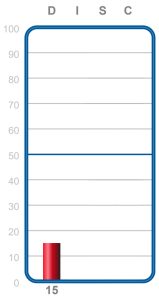Unleash Your Inner Leader: Interview Tips for Low D Personalities

Preparing for a job interview by focusing on your strengths can give you a competitive edge and show the interviewer why you would be a good fit for the role. By understanding your unique qualities as someone who is Low Dominance (Low D) on IndigoPathway’s DISC assessment and preparing to articulate them effectively, you can increase your confidence and improve your chances of landing the job.

Someone who scores below 50 in the DISC Influencing behavioral style (red bar on the DISC graph) is considered “low” in that style.
Here are a few interview tips for a low dominance personality on the IndigoPathway DISC assessment:
Be confident and expressive.
Low dominance individuals tend to be more humble, so it’s important to show confidence and express your strengths during the interview.
Be prepared to speak about your accomplishments.
Low dominance individuals tend to be more reserved and may not naturally highlight their accomplishments, so be prepared to speak about your accomplishments during the interview.
Show your ability to work well in a team.
Low dominance individuals tend to be team-oriented, so be prepared to give examples of how you have worked well in a team in the past.
Show your willingness to learn and grow.
Low dominance individuals tend to be open to learning and growing, so be prepared to discuss your professional development goals and how you plan to continue learning and growing in your career.
Show your ability to think critically.
Low dominance individuals tend to be analytical and thoughtful, so be prepared to give examples of how you have used critical thinking in the past to solve problems or make decisions.
Be a good listener.
Low dominance individuals tend to be good listeners, so be prepared to actively listen to the interviewer and respond thoughtfully to their questions.
Show your ability to adapt and be flexible.
Low dominance individuals tend to be adaptable and open to change, so be prepared to give examples of how you have adapted to changes in the past.







Responses